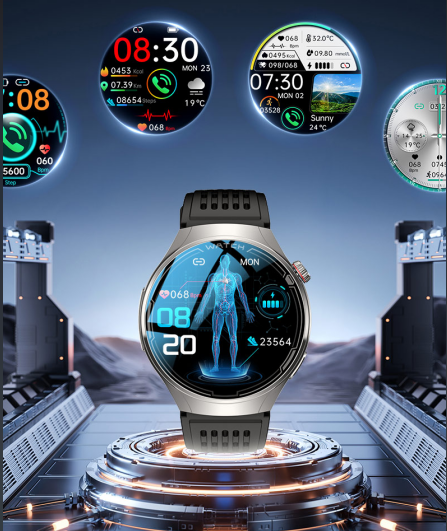Unlocking Opportunities: Low MOQ and High Customization ODM Solutions for Startups in 4G Smart Watches
10/13/20255 min read


Understanding ODM: What It Means for Startups
Original Design Manufacturer, commonly referred to as ODM, plays a pivotal role in the product development landscape, particularly for startups entering the competitive market of 4G smart watches. An ODM specializes in designing and manufacturing products based on the specifications provided by a client. This arrangement allows budding entrepreneurs to leverage the expertise of established manufacturers while focusing their resources on marketing and sales.
For startups, particularly those with limited financial resources and operational capabilities, the concept of low Minimum Order Quantities (MOQ) becomes especially significant. Traditional manufacturing often requires large initial orders, which can be a substantial barrier for startups. Through ODM partnerships, startups can engage in low MOQ arrangements that allow them to produce smaller quantities of 4G smart watches, reducing financial risks while still enabling innovation. This model is particularly beneficial for businesses testing new ideas or designs in the marketplace, as it supports iterative development without overcommitting financially.
Furthermore, ODMs provide a unique balance between innovation and cost-effectiveness. They often come equipped with advanced technology and manufacturing processes, which startups may not have the means to develop independently. By collaborating with ODMs, startups can access cutting-edge solutions and insights into industry trends, facilitating the creation of differentiated products that meet consumer demands. This partnership not only accelerates the product development cycle but also enhances the likelihood of market success.
Ultimately, embracing an ODM model enables startups in the 4G smart watch market to maintain agility, minimize initial investments, and foster a culture of innovation. As they navigate the complexities of product development and market entry, the strategic advantages of ODM partnerships can prove to be invaluable in their growth journey.
The Importance of Low MOQ for Startups
In the ever-evolving landscape of innovative technology, especially in the realm of 4G smart watches, startups often face unique challenges. One key metric that can significantly impact their success is Minimum Order Quantity (MOQ). Low MOQ offers startups the opportunity to enter the market with minimal financial exposure. This flexibility is essential for new businesses, as it allows them to experiment with their product offerings before committing to larger orders that could strain their budgets.
Lower MOQs facilitate a lean startup approach, enabling entrepreneurs to quickly test market response and gather valuable customer feedback. For instance, a startup developing a new smart watch may start with a production run of only 100 units. By distributing these initial products, they can analyze consumer preferences and adjust features, pricing, and marketing strategies accordingly. This iterative process not only minimizes potential losses but also helps refine the product to better meet market demands.
Many successful startups have leveraged low MOQ strategies to navigate their initial product launches. A notable example is a tech startup that introduced a customizable smart watch band. With a low MOQ of just 50 units per color and type, they could gauge customer interest in various designs without risking significant capital. As customer preferences became clear, they adjusted their inventory accordingly, ultimately resulting in enhanced customer satisfaction and increased sales volumes.
To negotiate favorable terms with manufacturers, startups should focus on building strong relationships and communicating their vision clearly. Effective negotiation can often lead to more accommodating MOQ terms, granting startups the flexibility they need. Additionally, showcasing a clear business plan and market research can bolster credibility in negotiations. This strategic approach not only mitigates financial risk but also positions the startup for sustainable growth.
Maximizing Customization: Tailoring 4G Smart Watches to Your Brand
The rapid evolution of technology has paved the way for startups to enter the competitive market of 4G smart watches. A critical aspect that sets a brand apart is its capacity for customization within the Original Design Manufacturer (ODM) framework. With high levels of customization, startups have the opportunity to distinguish their products through personalized features, design modifications, and tailored branding options.
Startups can enhance user experience by incorporating innovative functionalities that cater to specific consumer needs. For instance, integrating health monitoring features that align with the target audience’s lifestyle preferences can significantly elevate product desirability. By leveraging data analytics, companies can identify trends and features that resonate with their demographic, ultimately optimizing the smart watch's usability and attractiveness.
Design modifications play a crucial role in achieving a unique identity for 4G smart watches. Aesthetic elements, such as color options, strap materials, and watch face designs, can be tailored to reflect a brand's ethos. Furthermore, the ability to offer limited edition models or customizable features allows a startup to capture the attention of niche markets, fostering customer loyalty and engagement.
Additionally, branding opportunities abound within the realm of high customization. Startups can create exclusive packaging designs or promotional materials that resonate with the brand image, enhancing the overall customer experience. Case studies exemplifying successful high customization strategies highlight how brands have effectively utilized these elements to foster affinity among consumers. Companies that have embraced personalization often report heightened customer satisfaction and increased market share, demonstrating the value of a tailored approach in the 4G smart watch industry.
In conclusion, maximizing customization through ODM solutions offers significant potential for startups in the 4G smart watch market. By focusing on personalized features, distinctive design, and effective branding strategies, these companies can carve out a niche and thrive amidst stiff competition.
Navigating Challenges: Choosing the Right ODM Partner
When it comes to selecting an Original Design Manufacturer (ODM) for 4G smart watches, startups often face a series of challenges that can significantly influence their long-term success. The first step in this process is to thoroughly vet potential manufacturers. Entrepreneurs should prioritize conducting comprehensive research to identify ODMs with a proven track record in the smart watch industry. Key indicators of reliability may include client testimonials, industry certifications, and an established portfolio of successful product launches. This due diligence helps mitigate risks associated with quality and service reliability.
Another crucial aspect is evaluating the ODM's capacity for customization. Startups should assess whether the manufacturer can meet specific design requirements or cater to unique features needed for their smart watches. Engaging in detailed discussions about design flexibility, material choices, and technological capabilities ensures the chosen partner can align with the startup's vision and goals. It is advisable to request samples or prototypes to better understand the ODM's capabilities in delivering tailored solutions that resonate with the target market.
Furthermore, ensuring robust quality control measures is essential. Startups must inquire about the ODM's quality assurance processes, including testing procedures and compliance with industry standards. Establishing clear expectations for quality at the onset of the partnership can lead to smoother production phases and reduced instances of product defects.
Communication plays a vital role in nurturing a productive relationship with ODM partners. Startups should establish clear lines of communication and set regular check-ins to stay updated on production timelines, potential delays, and necessary adjustments. Additionally, considering the implications of scaling up production is vital. Startups must evaluate the manufacturer's capacity to handle increased order volumes, ensuring that they can adapt quickly without compromising quality or timelines. By focusing on these critical elements, startups will be better equipped to forge strong partnerships that foster innovation and drive success in the competitive smart watch market.
